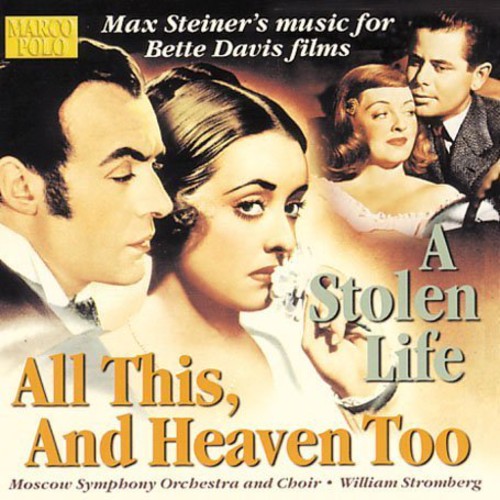1
/
of
1
Naxos
Steiner/ Moscow Symphony Orchestra/ Stromberg - All This & Heaven Too a Stolen Life
Steiner/ Moscow Symphony Orchestra/ Stromberg - All This & Heaven Too a Stolen Life
Regular price
$22.99
Regular price
Sale price
$22.99
Unit price
/
per
Shipping calculated at checkout.
Usually ships within 1 to 2 weeks.
Couldn't load pickup availability
SKU:NXS8570184.2
Share
The orchestra for All This, and Heaven Too was large, consisting of three flutes (doubling piccolo and alto flute), two oboes (doubling English horn), three clarinets (doubling bass clarinet), and two bassoons making up the woodwinds. The brass includes four French horns, four trumpets, four trombones and tuba. The percussion requires four players, although seven players are needed for The Carousel. Two harps, two pianos, celeste, organ, strings, and small choir complete the complement. A Stolen Life, as mentioned previously, demonstrated Steiner's more restrained and less complex scoring. Although the orchestra is still a large one, many cues dispense with the brass (with the exception of French horns), and the woodwinds play a major part in bringing a nautical feel to the proceedings. After Steiner's Warner Bros. Signature music, the composer introduces the Stolen Life theme that is bold, wide open, with harp arpeggios suggesting the milieu of the sea. As previously stated, this score looks ahead to the style Steiner would adopt for most of the scores he composed during the fifties and beyond. The composer also looks back nostalgically to his RKO period in the early thirties. Besides the piano source piece which Rudy Behlmer mentions in his notes, Steiner reprises his moody fog music from King Kong as well as the Shopping Tour music, originally composed for the RKO 1933 production Sweepings, which dealt with the building of a department store empire. Steiner must have associated "department stores" with this music. In many ways, Steiner's style was slowly reverting to the simpler, more defined melodic and harmonic language first employed for the dramas at RKO, although he had a bigger and more polished orchestra available to him at Warners, not to mention the recording advances developed in the intervening years. The orchestra requirements for A Stolen Life were somewhat modest as compared to most Warner scores of the period. The woodwinds were in pairs, with an extra clarinet playing bass clarinet exclusively. Four horns were the norm, although four trumpets and trombones and one tuba were brought in for the bigger cues. The percussion consisted of five players. There were two harps, pianos, and one celeste, as well as the usual complement of strings.



